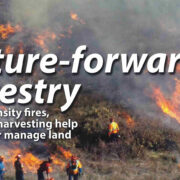From CFI Magazine, May/June 2020 | woodbusiness.ca
Northland Forest Products is the largest of seven volume-based tenure holders on Al-Pac’s FMA. The family-owned sawmill just north of Fort McMurray produces around 75 mmbf annually of spruce, pine and fir.
For the past three years, Northland and Al-Pac have been working towards an integration of their respective wood-land operations. In January 2019, that integration achieved a milestone when Northland was added to Al-Pac’s FSC forest management certificate.
“It became a group certificate,” Biro says. “So Al-Pac is the group entity and manages that certificate, with Northland as one of the members.”
As a member, Northland must meet all the requirements of the FSC forest management certification, but is able to do so with strong support from Al-Pac as the certificate managers.
“With our integrated operations, at the operational planning level and at the field level, it really makes it a natural progres-sion for them to become certified. It works really well and it’s very exciting for them,” Biro says. “It gives them verification and recognition for the good work they do.”
Kim Norris, health and safety coordinator for Northland Forest Products, says Al-Pac’s expertise and guidance were crucial to them achieving certification last year and will continue to be important as they maintain the standards.
“Tina has been bringing us up to speed on the new standards and we will continue to rely on her and Al-Pac to help us reach those new standards in 2020. Al-Pac deserves a lot of credit for getting us to the standards, and our employees share in the success of continuing to achieve those standards. In short, without a fantastic working relationship based on a shared vision, we would not have achieved FSC certification,” Norris says.
While FSC certification does not translate to higher sales pricing for their wood products, they expect it will open the door to new markets.
“We see a great opportunity to reduce our environmental footprint while adding value to the products we produce,” Norris says. The environmental benefits of the companies’ woodlands integration lie in the overlapping land base, Biro says. As an example, they can arrange for a single harvesting operation with shared contractors and a single access road to minimize disturbance of the area.
Northland has also obtained FSC chain of custody certification for its lumber products. Chain of custody certification tracks wood products from a sawmill to a customer, allow-ing producers to label their goods as FSC products.
The mill sells its FSC-certified wood chips to Al-Pac, but Norris says they are challenged by a limited market for certified lumber, shavings, hog fuel and sawdust. Those products are sold by brokers, who are required to also be FSC certified in order to maintain the chain of custody necessary to sell Northland’s product as FSC certified. Without a strong market, it’s difficult to get broker buy-in to become certified, Norris says.
“It will take a big push from consumers who want to purchase sustainably harvested products for changes to be made, but consumers are becoming more particular all the time,” she says.

